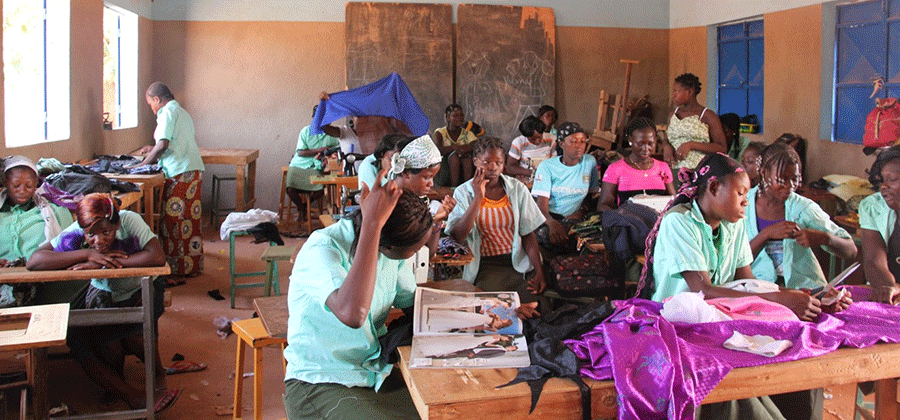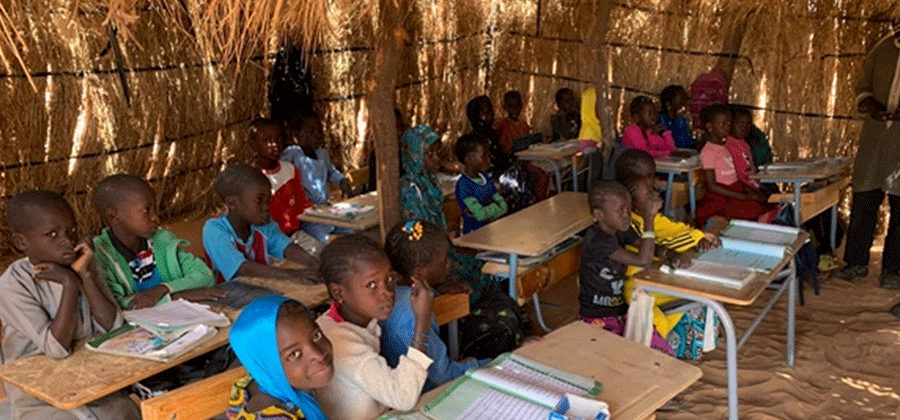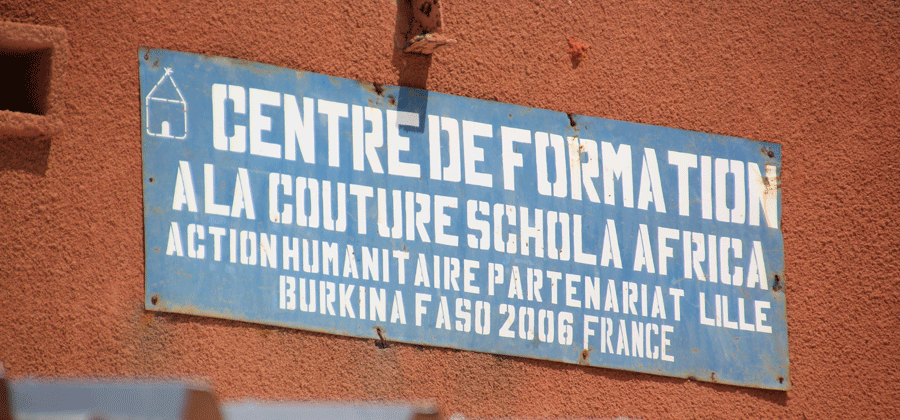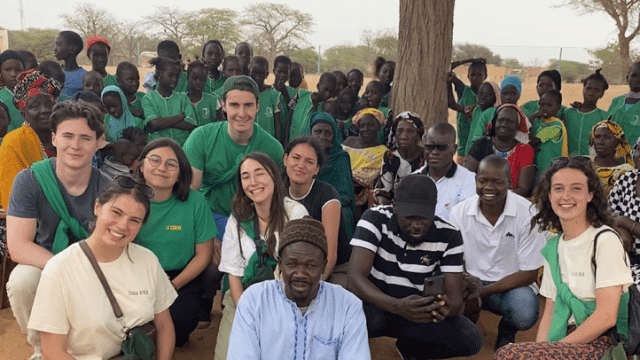Catching up with our graduates’ favourite student association at the 2023 EDHEC Alumni inter-association competition
Find out all about the student project that won over delegates at the EDHEC Alumni Campus Day!
Last October, we invited 8 student associations to pitch their projects to the 300 graduates who had travelled to attend their class reunions on the campus in Lille. The Schola Africa project stood out as the clear winner and received financial support from EDHEC Alumni to boost their work in 2024. We caught up with this energetic and ambitious team to find out more about their ongoing projects.

Schola Africa: the iconic EDHEC association embodying international solidarity
Schola Africa focuses on primary schools and vocational training for women in rural areas of Senegal and Burkina Faso, while at the same time raising awareness among the EDHEC community.
Since it was founded in 2000, Schola Africa has built 25 classrooms and 46 latrines in Senegal and Burkina Faso, enabling more than 1300 pupils to attend school. Each year, the association rolls out additional projects to improve the conditions of education in the schools it works with, including the distribution of solar lamps, purchase of school equipment and installation of new libraries.
In 2002, we opened a sewing school dedicated to women from Bobo Dioulasso, in Burkina Faso. It gave more than 330 women the chance to obtain a diploma recognised by the Burkinabe state, thus contributing to their emancipation.
Since 2023, Schola Africa has also supported the vocational and ecological training centre (CFPE) near Saint-Louis in Senegal. This centre runs training courses in hairdressing, sewing and catering for women. Schola Africa sponsors its pupils for a duration of 3 years’ training and finances the purchase of educational materials.

Photo of one of the classrooms at our training centre in Burkina Faso
What are you working on at the moment?
We are currently working to set up an educational garden in Mbaylar school in Senegal, with the aim of combating malnutrition and creating a source of revenue and an educational tool for the school.
This project involves installing an agricultural garden on school premises in the Saint-Louis region, protected by fencing and connected to a water supply. The aim is to grow fruit and vegetables that reflect the dietary habits of the children depending on the season, using agricultural practices that respect the environment.
Part of the harvest will be sold to generate revenue, which will then be used to purchase stationery and schoolbooks, as well as manage the garden (purchasing seed and equipment). It will also serve as an educational tool for teaching staff, so they can raise the children’s awareness of the problems linked to sustainable development as well as good dietary practices.
How do you measure the impact of your projects?
First of all, the main indicator used to evaluate the impact of our projects on the educational conditions in the schools we work with is the success rate in the end-of-primary certificate (CFEE) in Senegal and the primary studies certificate (CEP) in Burkina Faso for final-year pupils. These certificates are issued to pupils who pass the exam taken at the end of the primary education cycle, an indication that they have acquired the basic skills necessary to move on to secondary education. We also closely follow changes in the number of pupils registered in our schools or the number of women in our training centre to measure the effect of our actions. The more we commit to the projects in these schools, the more attractive they become, which results in a rise in participant numbers.
Have you any examples of recent successes?
We recently enabled the construction of a long-term classroom in a school in Mérina Sall in Senegal, which we have been working with since April 2021.
To accommodate 126 pupils in 2023, the school had four classrooms built from durable materials and two temporary shelters. The classroom we are currently building will replace one of the two wooden shelters being used as a classroom.

Photo of one of the temporary shelters taken in April 2022
This project builds on our earlier work in the school, which we have been working with since April 2021. Given the significant needs in terms of infrastructure and school equipment, as well as the motivation of the teaching staff, which we were able to see for ourselves the first time we visited, we decided to take on the work. Since then, we have distributed school equipment and solar lamps. We have also financed the construction of a wire mesh fence for the security of the pupils and teaching staff, as well as latrines to improve sanitation conditions. A library has also been set up in one of the classrooms to meet the need for books expressed by teachers. Since we first intervened, the school principal and his teaching staff have told us how their working conditions and those of the pupils have improved. The increase in CFEE success rates further reflects this improvement. These rates have risen considerably, reaching 56% in June 2022 and 100% in June 2023. This new learning environment has allowed pupils to continue their studies and further encourages parents to send their children to school.
The distribution of lamps is another example of an initiative that has transformed the lives of people in the schools.
Most of the villages we work in, whether in Senegal or Burkina Faso, don’t have access to electricity. But in both countries, night falls around 6 PM. With no source of light, children are unable to do their homework in the evening. Since we launched the project in 2013, 1781 lamps have been distributed to ensure pupils progress more effectively in their education.
Who are your local partners?
One of the founding principles of our association is participatory development. Each of our projects takes place in collaboration with local stakeholders so we can be sure that the solutions rolled out meet their needs. In advance, we always consult teaching staff and local institutions like the education and training inspectorate (IEF) in Saint-Louis to confirm the relevance and compliance of each of our projects. Participatory development also involves boosting the local economy. That’s why we collaborate with local entrepreneurs for the implementation of our projects, such as building classrooms.
At the same time, Le Partenariat, an association located in Lille and Saint-Louis, supports the administrative rollout of our projects. Building on its experience in Senegal, it helps us particularly when choosing tradesmen through calls for tenders or signing contracts. We rely on local teams with an on-site presence all year round to monitor projects in our absence.

What’s next for Schola Africa EDHEC?
Since September 2023, we have been working on a new area: access to water. Many of the schools we work with don’t have access to drinking water and are not among the schools targeted by State plans. We look for the most suitable solutions for the specific context of each school, as well as possible synergies with Le Partenariat.
We continue our work in the schools we have been supporting for some years, but are also hoping to extend our support to others. We are currently thinking about expanding our training centre in Burkina Faso and developing a sponsorship programme for girls in the CFPE in Senegal.
How do you plan to use the donation you received from EDHEC Alumni at the EDHEC Alumni Campus Day?
We will use this money to equip the classroom built in Mérina Sall with school desks and chairs. The order will be placed with the regional centre for vocational training (CRFP). This centre offers woodwork training courses in particular. As with all of our projects, the aim is to improve the conditions of education, put in place concrete actions and contribute to the development of vocational training.
How can EDHEC graduates encourage or support you?
First of all, they can offer strategic advice on how to manage our projects or optimise resources, building on their own professional expertise. They can also provide financial support by taking part in our fundraising efforts (for example by making a donation on our website or via crowdfunding) or by mobilising resources within their professional network to sponsor girls at the CFPE. Finally, they can help raise awareness of the causes we support by sharing information about our projects and encouraging their contacts to get involved.
Follow us on our website and on social media to keep up to date and contribute to our projects in the future. We regularly communicate about our work and can easily be contacted for any suggestions or proposals.

Comments0
Please log in to see or add a comment
Suggested Articles


